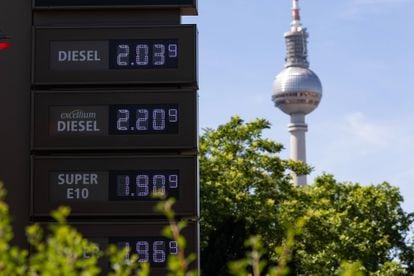Fuel prices at a TotalEnergies gas station in Berlin on June 17. Krisztian Bocsi (Bloomberg)
Industrial prices, which include the cost of products leaving the factory, rose 33.6% in Germany in May, which represents the highest increase since the beginning of the historical series, in 1949. The main culprit of the rises is the price of energy, which has been skyrocketing for months and shows no sign of moderating, quite the contrary, in the near future.
Industrial production prices are seen as a precursor to the development of inflation, so the German figures indicate that the increase will pass through more to the pockets of consumers.
The annual variation rate of the CPI reached 7.9% in May, five tenths more than the previous month.
Prices had not risen this much in Europe's main economy since the oil crisis in the early 1970s.
"This is the largest year-on-year increase since data began to be collected in 1949," the German statistical agency, Destatis, said in a statement on Monday.
“As a result, producer prices are posting new record increases every month since December 2021 compared to the same month the previous year,” she adds.
This data records the cost of the products before they are processed or marketed.
The figure for May is one tenth higher than that for April and adds to the 30.9% recorded in March.
Energy prices in Germany were 87.1% higher in May than in the same month last year and have not stopped rising since the start of the Russian invasion of Ukraine.
If compared to the previous month, they increased by 2.5%.
Natural gas is the one that has had the greatest impact on the year-on-year rate of change in the cost of energy, since the distribution price increased by 148.1% compared to May 2021. In the case of the price paid by the plants that used to produce electricity the rise is stratospheric: 241.2%.
For industrial customers - who use it for the production of metals, rubber, plastic, cement, glass or ceramics - the bill has risen 210.7% compared to last year.
Food prices continue to rise, with very high increases in basic products such as milk, coffee and butter.
On average, food products were 19.2% more expensive in May, with some particularly sharp increases, such as that of butter, which shot up 80.2%.
Germany produces 21% of all butter in the European Union and is one of the largest consumers per capita.
Beef has become 42.9% more expensive.
Coffee, 33.6%.
Milk and other dairy products are now 24.1% more expensive on average than last year.
Withdrawal of subsidies
Since the beginning of the war in Ukraine, the increase in energy prices, which had already been observed in the previous months, has skyrocketed and with it, the significant impact on the inflation rate.
The 7.9% year-on-year rise registered in May represents a new record in more than forty years.
"The inflation rate has reached a new high for the third consecutive month in unified Germany," said Destatis president Georg Thiel during the data presentation last week.
"The last time there was such a high rate of inflation was in the winter of 1973/1974 in the former federal territory, when oil prices went up a lot as a result of the first oil shock," he added.
In April, inflation was 7.4%;
in March, 7.3%.
The German Finance Minister, Christian Lindner, has shown his concern about the high rate of inflation.
“Combating it must be our top priority,” he said before the May data was released.
"Inflation is a huge economic risk and we must combat it so that an economic crisis does not arise, so that a spiral does not develop through which inflation feeds on itself."
This week, in an interview with
Die Welt
, responded to the question of when prices will stop skyrocketing, which will depend on how the German government reacts in the political arena and the central banks in the monetary arena.
"As a government, our task is not to raise prices further with subsidies, not to continue to increase the debt or suffocate ourselves with higher interest costs," he assured.
In the interview he also announced that he wants to withdraw subsidies for electric cars, which in Germany can reach 20,000 euros per vehicle.

